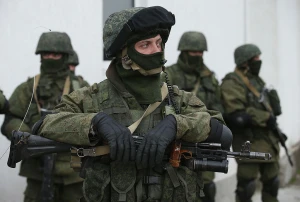
ISW: Russia's blocking of grain deal jeopardizes Kremlin's own commitments
Russia's blocking of the "grain deal" could jeopardize food supplies to several countries that are the Kremlin's target audience
This was reported by the Institute for the Study of War (ISW).
“Ukraine harvests most of it grain between July and August, and Russia’s strikes on Ukrainian port and agricultural infrastructure can further complicate Ukraine’s ability to free up space for newly harvested grains. Prolonged disruptions to grain logistics in Ukraine will likely have increasingly cascading effects on grain supplies, adding to the sense of urgency that the Kremlin hopes to create.
The Kremlin routinely engages in escalatory rhetoric surrounding the West’s support for Ukraine in an effort to shape Western behavior, although Russia appears notably to be conducting these shaping efforts concerning the grain deal with kinetic operations instead of rhetoric. It is unclear to what extent Russian forces intend to strike civilian ships in the Black Sea, although the Kremlin likely believes the announcement will have a chilling effect on maritime activity in the Black Sea and create conditions reminiscent of the complete blockade of Ukrainian ports at the start of the full-scale invasion,” the analysts' report reads.
The ISW believes that an attempt to obtain economic concessions from the West could undermine the Kremlin's international efforts by jeopardizing food supplies to several countries that the Kremlin targets.
"Russian strikes against Ukrainian port and grain infrastructure and naval posturing also continue to illustrate that the Kremlin is willing to use naval and precision strike assets to prioritize immediate economic concerns instead of operations in Ukraine that pursue the Kremlin‘s overall campaign objectives," the Institute added.
Russia's termination of the grain deal
On 16 July, the last ship loaded with Ukrainian agricultural products under the initiative left the port of Odesa. On 17 July, Russia announced the termination of the grain deal. In response, Volodymyr Zelenskyy said that it was necessary to continue using the grain corridor even despite Russia's withdrawal from the agreement. And Kuleba began urgent consultations at the UN.
The White House condemned Russia's withdrawal from the grain deal, which played a crucial role in reducing global food prices.
On 18 July, Russian presidential spokesman Dmitry Peskov said there were "certain risks" for parties trying to resume the Black Sea Grain Initiative without Russia's participation.
European Commission President Ursula von der Leyen said that it was critical to restore transport links across the Black Sea to provide food to the world's most vulnerable countries and to preserve the ability to export Ukrainian goods.
On 19 July, it was reported that Ukraine was considering transporting food as part of the grain initiative through the territorial waters of Bulgaria and neighboring Romania.
At the same time, the Russian Ministry of Defence issued a statement threatening ships heading to Ukraine's Black Sea ports. On the same day, Putin named the conditions for Russia's return to the grain deal and demanded their immediate implementation
The EU's chief diplomat, Josep Borrell, said that the only response to Russia's threats could be to increase military assistance to Ukraine.
In turn, the Ministry of Defense announced that starting July 21, all ships heading to the Black Sea in the direction of Russian seaports and Ukrainian ports on the temporarily occupied territory may be treated as military cargo by Ukraine.
On July 20, Austrian Foreign Minister Alexander Schallenberg said that Russia's withdrawal from the grain deal and its threats to fire on Ukrainian ships was a "slap in the face to African countries" that depend on Ukrainian grain.
On the same day, Zelenskyy held the first conversation in the history of bilateral relations with Ethiopian Prime Minister Abiy Ahmed Ali, speaking about Russia's unilateral withdrawal from the Black Sea Grain Initiative, the illegal blocking of shipping, and the shelling of Ukraine's port and energy infrastructure.
- On June 4, the Ukrainian Armed Forces launched a counteroffensive on the southern frontline, continuing a series of offensive operations near Bakhmut and in other directions.
- On June 19, Deputy Defense Minister of Ukraine Hanna Maliar reported that the Ukrainian Armed Forces liberated Pyatykhatky, Zaporizhzhia region, and advanced up to 7 km in the Tavria direction.
- On June 26, Deputy Defense Minister Hanna Maliar also said that the Ukrainian Armed Forces had de-occupied the village of Rivnopil, Donetsk region. It is located in the Volnovakha district of the Donetsk region. The Russian army occupied the village in March 2022.
- According to the General Staff on July 13, the Ukrainian Defense Forces continue to conduct offensive operations on three frontlines - Bakhmut, Melitopol, and Berdiansk. The General Staff reported that the Ukrainian army had some success in the areas of Novodanylivka - Shyroka Balka; Mala Tokmachka - Novopokrovka.
- The Defense Ministry reported that as of July 17, since the beginning of the Ukrainian Armed Forces' counteroffensive in the Bakhmut sector, the military had liberated an area of more than 30 km². In the Melitopol and Berdiansk directions, almost 180 km² of Ukrainian land were de-occupied.
- News














































